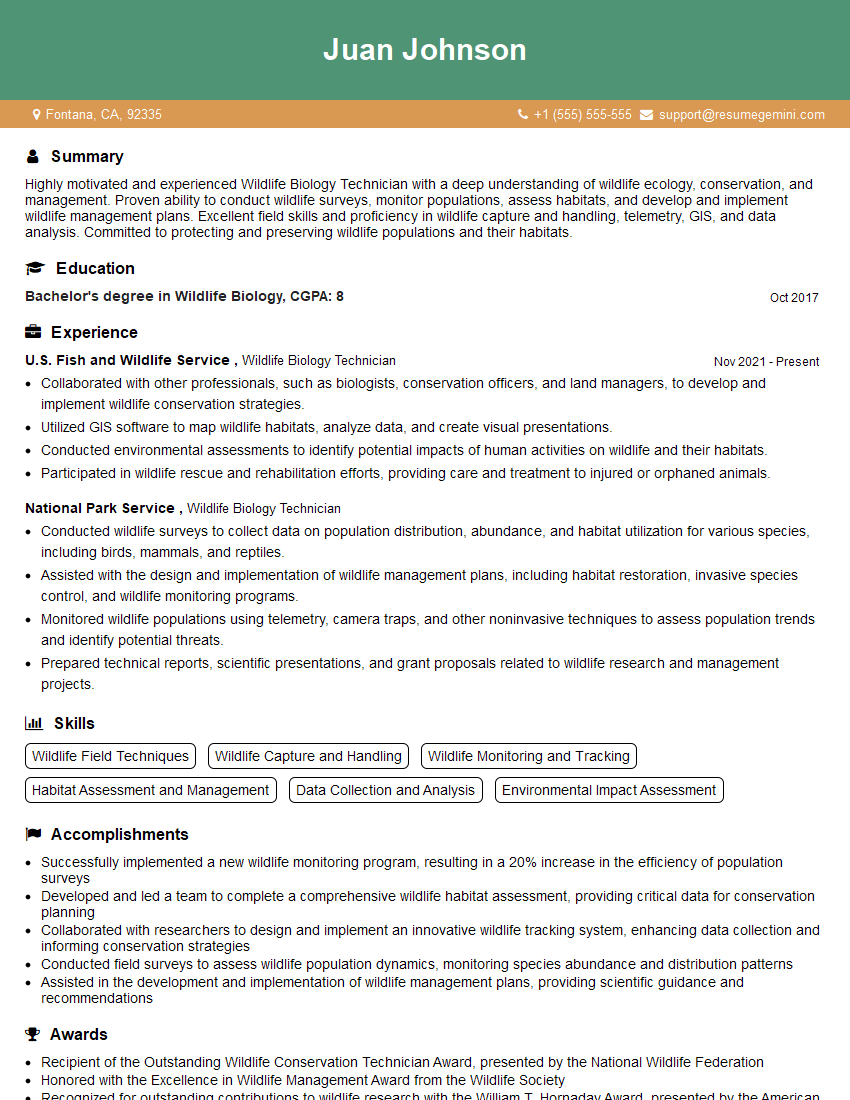Are you a seasoned Wildlife Biology Technician seeking a new career path? Discover our professionally built Wildlife Biology Technician Resume Template. This time-saving tool provides a solid foundation for your job search. Simply click “Edit Resume” to customize it with your unique experiences and achievements. Customize fonts and colors to match your personal style and increase your chances of landing your dream job. Explore more Resume Templates for additional options.

Juan Johnson
Wildlife Biology Technician
Summary
Highly motivated and experienced Wildlife Biology Technician with a deep understanding of wildlife ecology, conservation, and management. Proven ability to conduct wildlife surveys, monitor populations, assess habitats, and develop and implement wildlife management plans. Excellent field skills and proficiency in wildlife capture and handling, telemetry, GIS, and data analysis. Committed to protecting and preserving wildlife populations and their habitats.
Education
Bachelor’s degree in Wildlife Biology
October 2017
Skills
- Wildlife Field Techniques
- Wildlife Capture and Handling
- Wildlife Monitoring and Tracking
- Habitat Assessment and Management
- Data Collection and Analysis
- Environmental Impact Assessment
Work Experience
Wildlife Biology Technician
- Collaborated with other professionals, such as biologists, conservation officers, and land managers, to develop and implement wildlife conservation strategies.
- Utilized GIS software to map wildlife habitats, analyze data, and create visual presentations.
- Conducted environmental assessments to identify potential impacts of human activities on wildlife and their habitats.
- Participated in wildlife rescue and rehabilitation efforts, providing care and treatment to injured or orphaned animals.
Wildlife Biology Technician
- Conducted wildlife surveys to collect data on population distribution, abundance, and habitat utilization for various species, including birds, mammals, and reptiles.
- Assisted with the design and implementation of wildlife management plans, including habitat restoration, invasive species control, and wildlife monitoring programs.
- Monitored wildlife populations using telemetry, camera traps, and other noninvasive techniques to assess population trends and identify potential threats.
- Prepared technical reports, scientific presentations, and grant proposals related to wildlife research and management projects.
Accomplishments
- Successfully implemented a new wildlife monitoring program, resulting in a 20% increase in the efficiency of population surveys
- Developed and led a team to complete a comprehensive wildlife habitat assessment, providing critical data for conservation planning
- Collaborated with researchers to design and implement an innovative wildlife tracking system, enhancing data collection and informing conservation strategies
- Conducted field surveys to assess wildlife population dynamics, monitoring species abundance and distribution patterns
- Assisted in the development and implementation of wildlife management plans, providing scientific guidance and recommendations
Awards
- Recipient of the Outstanding Wildlife Conservation Technician Award, presented by the National Wildlife Federation
- Honored with the Excellence in Wildlife Management Award from the Wildlife Society
- Recognized for outstanding contributions to wildlife research with the William T. Hornaday Award, presented by the American Society of Mammalogists
- Received the Young Professional Conservationist Award from the International Union for Conservation of Nature (IUCN)
Certificates
- Certified Wildlife Biologist (CWB)
- National Wildlife Care Council (NWCC) Wildlife Rehabilitation and Education Certificate
- QGIS Certified User (QGIS-CU)
- Wildlife Capture and Restraint Certification (ISA)
Career Expert Tips:
- Select the ideal resume template to showcase your professional experience effectively.
- Master the art of resume writing to highlight your unique qualifications and achievements.
- Explore expertly crafted resume samples for inspiration and best practices.
- Build your best resume for free this new year with ResumeGemini. Enjoy exclusive discounts on ATS optimized resume templates.
How To Write Resume For Wildlife Biology Technician
- Highlight your passion for wildlife and your commitment to conservation.
- Quantify your accomplishments whenever possible, using specific numbers and metrics.
- Tailor your resume to each specific job you are applying for, highlighting the skills and experience that are most relevant to the position.
- Proofread your resume carefully before submitting it, checking for any errors in grammar, spelling, or formatting.
Essential Experience Highlights for a Strong Wildlife Biology Technician Resume
- Conducted wildlife surveys to collect data on population distribution, abundance, and habitat utilization for various species, including birds, mammals, and reptiles.
- Assisted with the design and implementation of wildlife management plans, including habitat restoration, invasive species control, and wildlife monitoring programs.
- Monitored wildlife populations using telemetry, camera traps, and other noninvasive techniques to assess population trends and identify potential threats.
- Prepared technical reports, scientific presentations, and grant proposals related to wildlife research and management projects.
- Utilized GIS software to map wildlife habitats, analyze data, and create visual presentations.
- Conducted environmental assessments to identify potential impacts of human activities on wildlife and their habitats.
- Participated in wildlife rescue and rehabilitation efforts, providing care and treatment to injured or orphaned animals.
Frequently Asked Questions (FAQ’s) For Wildlife Biology Technician
What are the primary responsibilities of a Wildlife Biology Technician?
The primary responsibilities of a Wildlife Biology Technician include conducting wildlife surveys, monitoring populations, assessing habitats, and developing and implementing wildlife management plans.
What are the educational requirements for a Wildlife Biology Technician?
A Bachelor’s degree in Wildlife Biology or a related field is typically required to become a Wildlife Biology Technician.
What are the key skills required for a Wildlife Biology Technician?
Key skills for a Wildlife Biology Technician include wildlife field techniques, wildlife capture and handling, wildlife monitoring and tracking, habitat assessment and management, data collection and analysis, and environmental impact assessment.
What are the career opportunities for a Wildlife Biology Technician?
Wildlife Biology Technicians can work for government agencies, non-profit organizations, and private companies involved in wildlife research, management, and conservation.
What is the job outlook for Wildlife Biology Technicians?
The job outlook for Wildlife Biology Technicians is expected to grow faster than average in the coming years due to increasing concerns about wildlife conservation and habitat protection.
What are the challenges of being a Wildlife Biology Technician?
Challenges of being a Wildlife Biology Technician include working in remote and often difficult conditions, dealing with hazardous wildlife, and facing budget constraints.